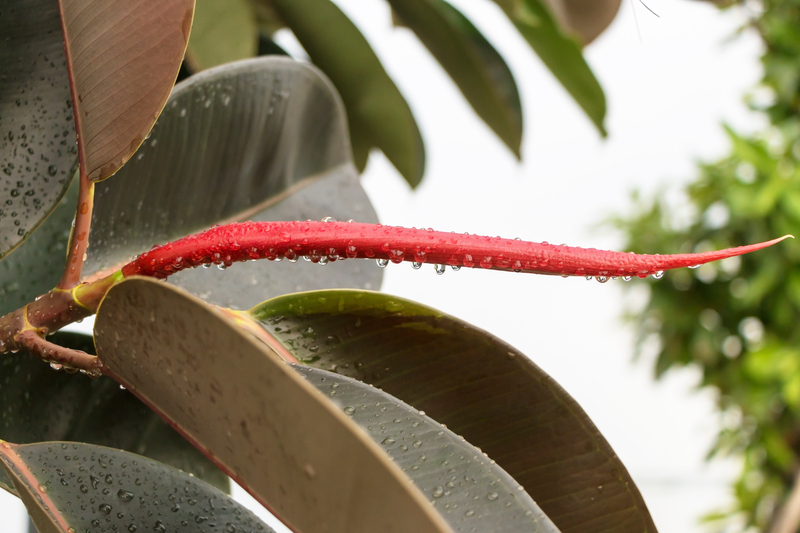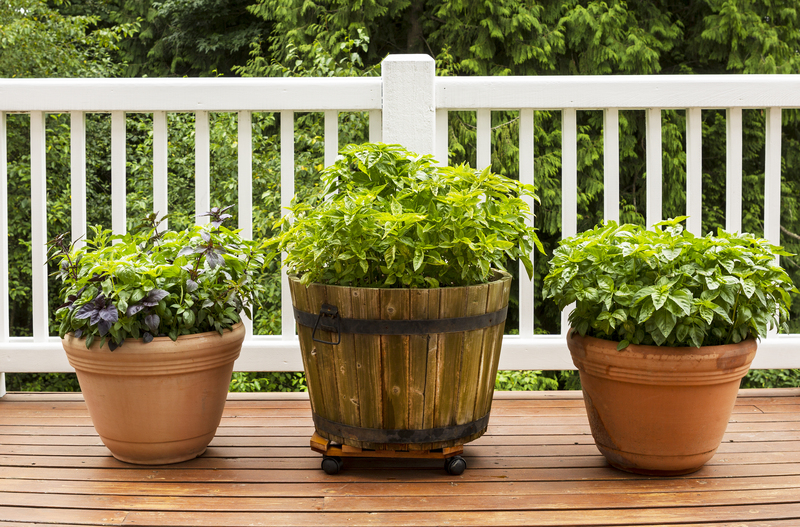Reawakening Your Garden: First Moves to Make
Posted on 24/08/2025
Reawakening Your Garden: First Moves to Make
As the chill of winter fades and the gentle warmth of spring begins to envelop the world, gardeners everywhere feel the call to step outside and reawaken their gardens. Whether you're a seasoned gardener or a budding green thumb, the initial steps you take in early spring can set the tone for a flourishing and beautiful outdoor sanctuary. This comprehensive guide will walk you through the essential first moves to make when reawakening your garden, ensuring your plants and soil are primed for vibrant growth throughout the season.
Why Prepare Your Garden for the New Season?
Many people wonder, "Why is it crucial to revive my garden after winter?" The answer lies in the transformative power of seasonal change. During winter, gardens endure harsh weather, frost, and periods of dormancy. Without proper spring intervention, old debris, compacted soil, and lingering pests can hinder new plant growth and even cause plant diseases. By proactively tending to your garden at the start of the gardening year, you give your plants room to thrive and promote long-lasting health for your outdoor oasis.

Assess the State of Your Garden
Walk Your Garden and Take Notes
Before diving into work, take a thorough walk around your property. Observe which areas need the most attention. Look for:
- *Patches of dead or matted grass*
- Broken branches or limbs
- Piles of leaves or garden debris
- Signs of disease or pest damage
- Bare spots needing new planting
This initial assessment helps you prioritize tasks and plan your resources for the weeks ahead.
Essential Garden Cleanup Steps
One of the most important first steps in any garden reawakening is tidying up your space. This creates a healthy, blank canvas on which your new growth can shine.
Clear Away Debris
Remove any leaves, sticks, and plant matter that accumulated over winter. Focus on:
- Flower and vegetable beds
- Lawn edges and walkways
- Compost piles and mulch layers
Use a rake, hand trowel, or gloved hands. Organic debris that isn't diseased can be composted to recycle nutrients back into your garden later.
Trim and Prune
Pruning is a key part of reviving your garden's structure. Early spring is ideal for:
- Trimming deadwood from shrubs and trees
- Cutting back perennials to encourage new growth
- Shaping hedges and bushes before they leaf out
Use clean, sharp pruning shears. Pruning improves airflow, reduces disease risk, and supports lush foliage or bloom later in the season.
Weed Control
Pull any weeds you spot before they can spread. Weeds compete for nutrients and moisture, so tackling them early puts your chosen plants at an advantage.
Soil Preparation: The Foundation of a Reawakened Garden
Test and Amend Your Soil
After months of rain or snow, your soil may be compacted and depleted of nutrients. Good soil is the backbone of a successful reawakening:
- Test your soil's pH and nutrient levels using an inexpensive soil kit (available at garden centers).
- Add organic matter like compost, well-rotted manure, or leaf mold to enrich your soil.
- Gently turn over the top 6-8 inches with a garden fork or tiller, aerating the soil for improved drainage and root growth.
- If your soil is heavy clay, consider mixing in coarse sand or gypsum.
Healthy, nutrient-rich soil is the heart of a successful, reawakened garden.
Mulching for Moisture and Weed Suppression
Once your garden beds are tidied and amended, lay down a fresh layer of mulch. Mulch:
- Conserves soil moisture
- Regulates temperature during cool spring nights
- Suppresses weed seeds from sprouting
- Enriches the soil as it breaks down
Use organic materials such as shredded bark, straw, or leaf mulch. Apply mulch in a 2-3 inch layer, but keep it from directly touching plant stems to prevent rot.
Reawakening Garden Beds and Borders
With the groundwork laid, it's time to bring color and life back to your garden beds and borders.
Choosing What to Plant First
- *Hardy annuals and perennials* are great early-season additions.
- Consider early-blooming bulbs such as daffodils, crocuses, and tulips, if not already planted in the fall.
- Plant bare-root trees and shrubs before they break dormancy.
Planning is crucial when reawakening your garden. Draw up a rough layout of colors and heights, and consider staggered bloom times for interest throughout the season.
Dividing and Transplanting
Many perennials benefit from being divided in early spring. This revitalizes old clumps, gives you new plants for free, and fills bare spots in your garden. Examples include hostas, daylilies, and ornamental grasses.
Direct Sowing Versus Starting Seeds Indoors
Some cool-weather crops--such as lettuce, spinach, peas, and radishes--can be directly sown into your vegetable garden as soon as the soil can be worked. For warm-season crops, consider starting seeds indoors to get a head start on growth before transplanting outside after the last frost.
Caring for Your Lawn During Garden Reawakening
Rake and Aerate
Winter often leaves lawns matted with dead grass and debris. Start by gently raking the lawn to remove this thatch. In compacted areas, use an aerator to allow air, water, and nutrients to reach the roots.
Feed and Reseed
Apply a balanced lawn fertilizer to provide essential nutrients. For bare or thin patches, overseed with appropriate grass seed. Water gently and consistently until new growth appears.
Watering and Irrigation Considerations
Inspect Your Systems
- Check hoses, sprinklers, and drip systems for winter damage or leaks.
- Clean out rain barrels and make sure gutters direct runoff away from beds.
Establish a watering schedule based on spring rainfall and the needs of new plantings. *Overwatering can be as harmful as underwatering*, especially before plants are actively growing.
Prevent Pests and Diseases Early
Monitor Closely
Check new shoots, leaves, and soil for signs of:
- Aphids and other insects
- Slugs and snails
- Mildew or mold
- Unusual leaf spots or discoloration
Remove pests by hand or use natural controls (like diatomaceous earth or neem oil) to nip problems in the bud.
Eco-Friendly Tips for Garden Renewal
- Compost garden debris to nourish your garden and minimize waste.
- Choose native and pollinator-friendly plants to support local wildlife.
- Minimize or avoid chemical fertilizers and pesticides.
- Use soaker hoses or drip irrigation to conserve water.
Design Inspiration: Refreshing Your Garden's Appearance
The beginning of the season is a perfect time to reimagine your outdoor space:
- Add paths or stepping stones for structure and easy access while working.
- Introduce colorful pots or containers for seasonal flowers.
- Install garden art, birdbaths, or seating areas for beauty and function.
- Consider vertical gardening techniques for small spaces.
Reawakening your garden isn't just about plants--it's about creating a space that nourishes the soul.

Monthly Garden Checklist: First Moves for a Thriving Garden
- March: Start seeds indoors, prune dormant trees, clear debris.
- April: Amend soil, divide perennials, sow cool-season crops.
- May: Plant annuals and summer bulbs, mulch beds, prep irrigation.
Adjust these tasks based on your climate zone and last frost date.
Conclusion: Embrace the Joy of Garden Reawakening
With thoughtful planning and a little effort, reawakening your garden after winter becomes an exciting, rewarding ritual. From the spark of new growth beneath the soil to the vibrant displays of blooming flowers, each task brings you closer to a thriving, tranquil oasis. By taking these first essential moves--cleaning, amending, planting, and nurturing--you lay the groundwork for garden success all season long. So put on your gardening gloves, step outside, and enjoy the transformation as you reawaken your garden this year!
Happy gardening!
Latest Posts
Innovative Approaches to Minimize Garden Storm Damage
Safeguarding Your Plants from Extreme Wind Conditions
Gardener's Toolbox: Essential Tools for the Avid Enthusiast
Elevate Your Backyard's Peace with Stunning Zen Garden Designs

